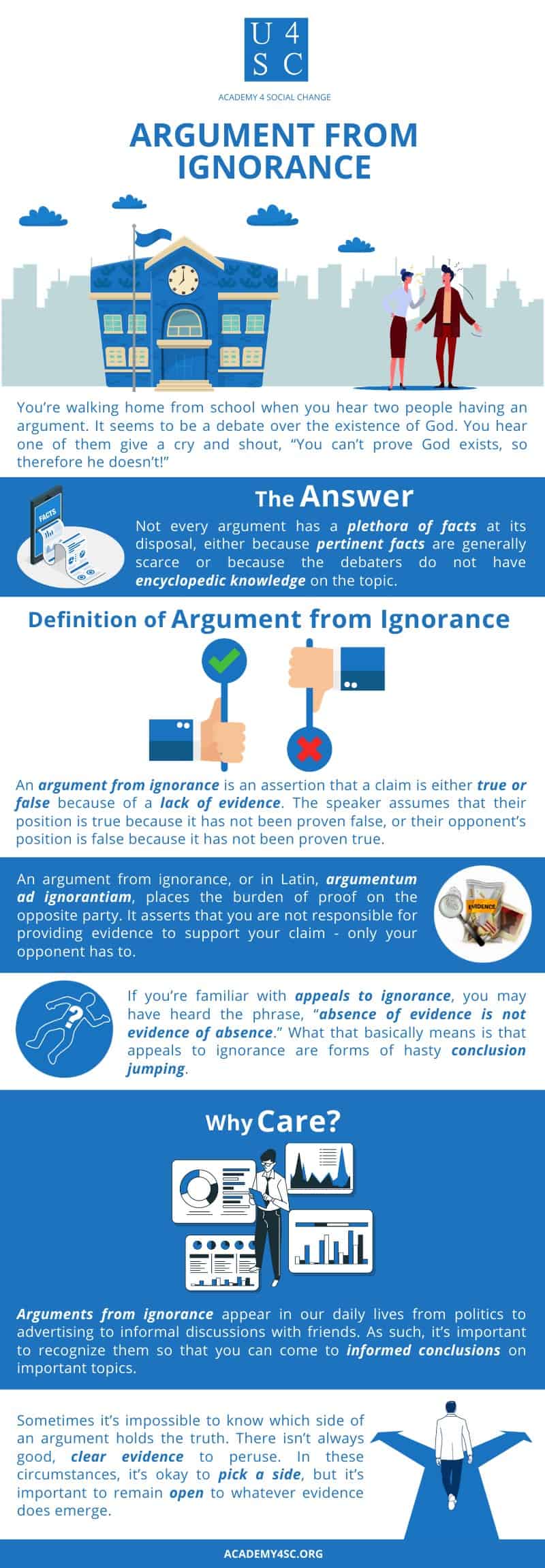Background
You’re walking home from school when you hear two people having an argument. It seems to be a very heated debate over the existence of God. Not wanting to get caught up in the age-old argument, you keep walking. You hear one of them give a frustrated cry and shout, “You can’t prove God exists, so therefore he doesn’t!”
Explanation
Not every argument has a plethora of facts at its disposal, either because pertinent facts are generally scarce or because the debaters do not have encyclopedic knowledge on the topic. Therefore, when one of the strangers argues that the lack of evidence of a deity proves that God does not exist, they are making a fallacious argument called an argument from ignorance.
Argument from Ignorance
An argument from ignorance is an assertion that a claim is either true or false because of a lack of evidence to the contrary. The speaker assumes that their position is true because it has not been or cannot be proven false, or that their opponent’s position is false because it has not been or cannot be proven true.
How It Works
An argument from ignorance, or in Latin, argumentum ad ignorantiam, places the burden of proof on the opposite party. In logical debates, if you make a claim, you’re responsible for providing evidence to support it. An argument from ignorance asserts that you don’t have to do this vital work - only your opponent has to.
If you’re familiar with appeals to ignorance, you may have heard the phrase, “absence of evidence is not evidence of absence.” What that basically means is that appeals to ignorance are forms of hasty conclusion jumping. To use the earlier example, the lack of evidence of the divine doesn’t prove anything beyond the absence of evidence. Through the use of another argument from ignorance, the opposing speaker could just as easily assert, “Well, you can’t prove God doesn’t exist, so he does!” Arguments from ignorance can always be turned back on those who first used them. In fact, this is a great way to point out to your audience and your opponent that a fallacy was used and that its conclusion isn’t necessarily right.
It’s important to note that arguments from ignorance don’t necessarily designate a user’s intelligence level. Any type of debater is capable of making this error.
Why Care?
Arguments from ignorance appear in our daily lives from politics to advertising to informal discussions with friends. As such, it’s important to recognize them so that you can come to informed conclusions on important topics.
There’s been a lot of recent discussion on whether there are non-fallacious types of appeals to ignorance. This argument results from an overextension of the term. If actual deductive reasoning is used from evidence of an absence, that is not an appeal to ignorance.
Say for example that your two younger cousins, Katie and Billy, are having an argument. Katie thinks that Billy took her toy and is hiding it in his toy chest. She checks Billy's toy chest but doesn't find her toy. If Billy insists, "You didn't find the toy - I told you I didn't take it!" he's not making an argument from ignorance. In this case, the absence of concrete evidence refutes Katie’s assumptions.
For a statement or argument to be an appeal to reasoning, it must involve a logical fallacy. To distinguish between the rational argument and the logical fallacy, ask yourself whether the absence of evidence could point to anything else. In other words, are you jumping to an unfair conclusion?
Sometimes it’s impossible to know for certain which side of an argument holds the truth. There isn’t always good, clear evidence to peruse. In these circumstances, it’s okay to pick a side, but it’s important to remain open to whatever evidence does emerge while simultaneously discerning its relevance.



